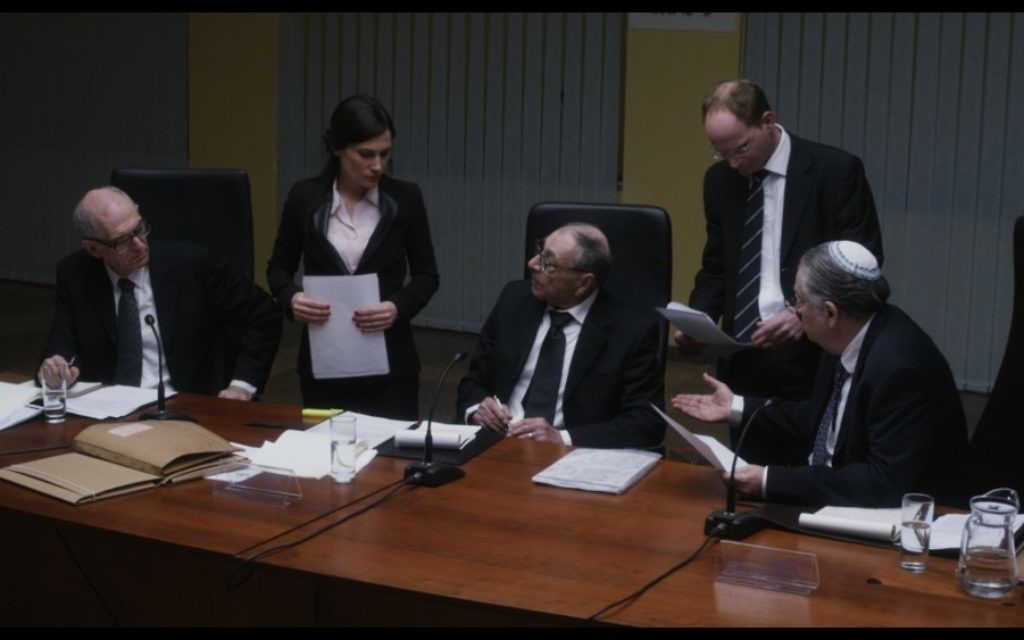AJFF Review: 2 Windows Into Rabin’s Life, Death
Yitzhak Rabin’s assassination was 20 years ago this past November, so it’s only natural that this Atlanta Jewish Film Festival should offer multiple looks at the Israeli prime minister who, for a moment in time, seemed to hold the key to actual Israeli-Palestinian peace.
Both of the Rabin films, the documentary “Rabin in His Own Words” and the Oliver Stone-style docudrama “Rabin, the Last Day” are technically well made, and both are more interesting than entertaining. They also make an excellent duo, and if you plan to see one, you should see both.

“Rabin in His Own Words” is the less challenging of the two movies, in part because at 110 minutes it’s only two-thirds the length of “The Last Day” and in part because the title says it all: The film is basically recordings of Rabin talking about his life from various interviews, set to archival photos and videos.
Get The AJT Newsletter by email and never miss our top stories Free Sign Up
The approach works well in spinning the basic life story of Rabin, but, of course, it goes only so deep. Rabin doesn’t engage in any meaningful self-analysis about how particular events affected him or molded his political outlook. He also doesn’t sift through a lifetime of experiences and declare some moments more important than others.
Fortunately, he doesn’t appear to have taken himself too seriously, and there are some funny moments, such as when a TV interviewer asks Rabin whether he ever wonders, “I am prime minister?” Rabin, at that point on his second stint leading the Israeli government, pauses, sighs, rolls his eyes and replies, “Well, first of all, it’s a fact.”
That self-deprecating humor is the happiest revelation in the documentary. Much like Abraham Lincoln, another man who was assassinated while trying to lead a deeply divided nation into a peaceful future, the elevation to eternal martyr buries a key part of Rabin’s greatness: that he seemed to shrug off his importance, seeing himself as an example of the times making the man instead of the other way around.
Director Erez Laufer deserves thanks for portraying Rabin as a real person and not just a symbol of the peace movement, even as the film inevitably moves to its conclusion in what is now Rabin Square in Tel Aviv on a November night in 1995.
Still, it would be nice if Rabin hadn’t been so prone to using a deep, gravelly monotone, and it would be even nicer to have some viewpoints other than Rabin’s.
For those non-Rabin perspectives, we have Amos Gitai’s based-on-a-true-story, conspiracy-driven “Last Day,” which begins with a lengthy monologue from Shimon Peres about his Labor Party rival and peace process ally.
In many ways, lengthy is the key word. As if working from the playbook of Stone, who needed more than three hours each for “JFK” and “Nixon,” Gitai lets “Last Day” run a leisurely 2½ hours so he can drive home his proposed solution to the question of how the assassin could have gotten so close to Rabin.
Much has been written about the film and its effectiveness at portraying the killer not as some lone fanatic compelled to act by vicious anti-Rabin, anti-Oslo rhetoric common in Israel in 1995, but as the intentional product of an organized incitement campaign. So it’s a surprise that Gitai holds back in chasing the conspiracy.
Early on, he shows a secret gathering of settler leaders and rabbis and the group’s decision to condemn Rabin to death. But Gitai doesn’t directly tie that cabal to the government, let alone implicate the man who has been an increasingly dominant force in Israeli politics since Rabin’s assassination, Benjamin Netanyahu.
As a portrayal of the anger splitting Israel under the Oslo Accords and as an exposé of the disappointing level of competence of those charged with protecting our leaders, “Last Day” is indispensable. The filmmaking is top notch, especially in telling the entertaining story of frustrated investigators. Just don’t expect that “JFK”-style moment of Donald Sutherland breaking down the conspiracy from a park bench in downtown Washington.





comments